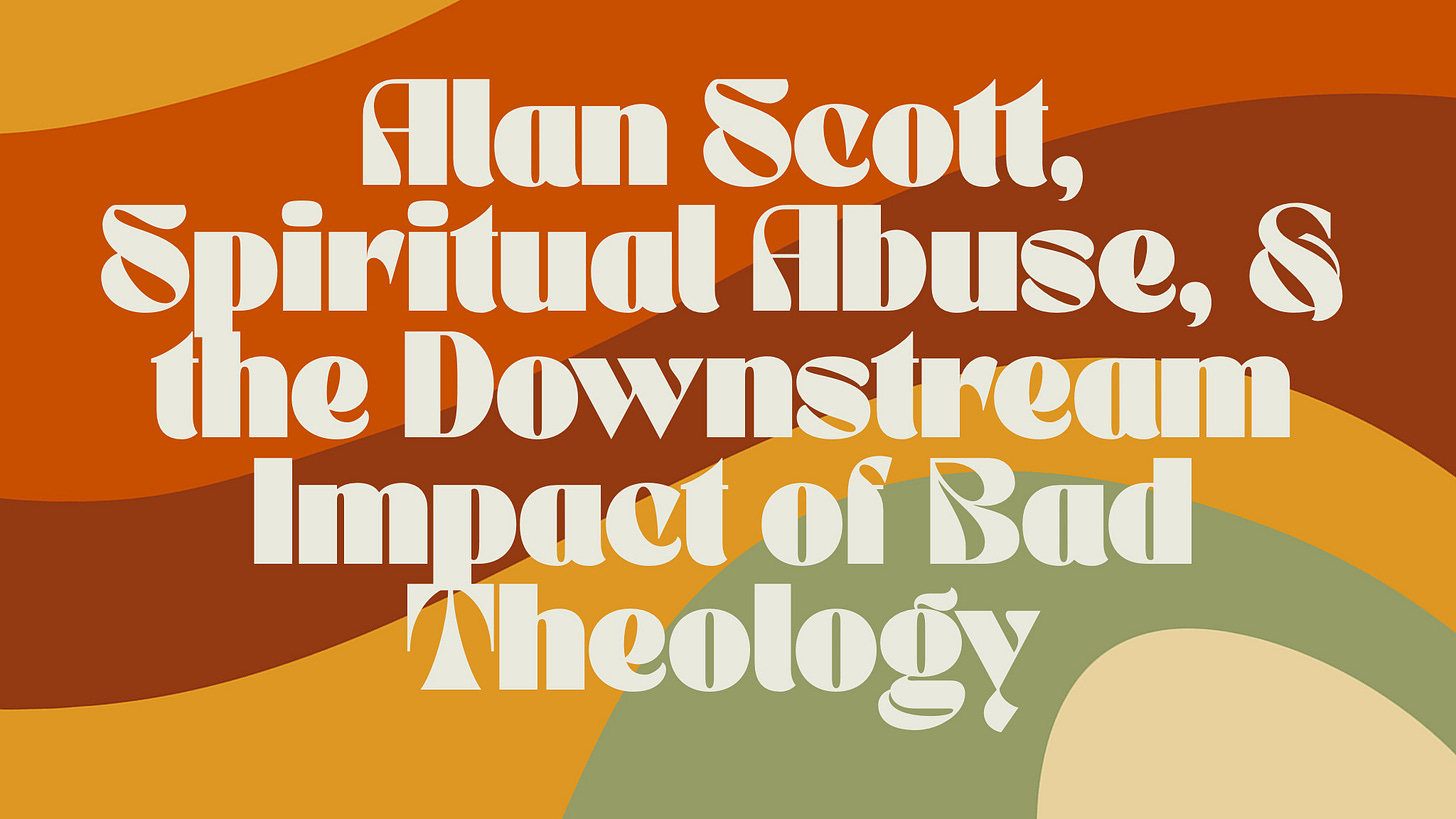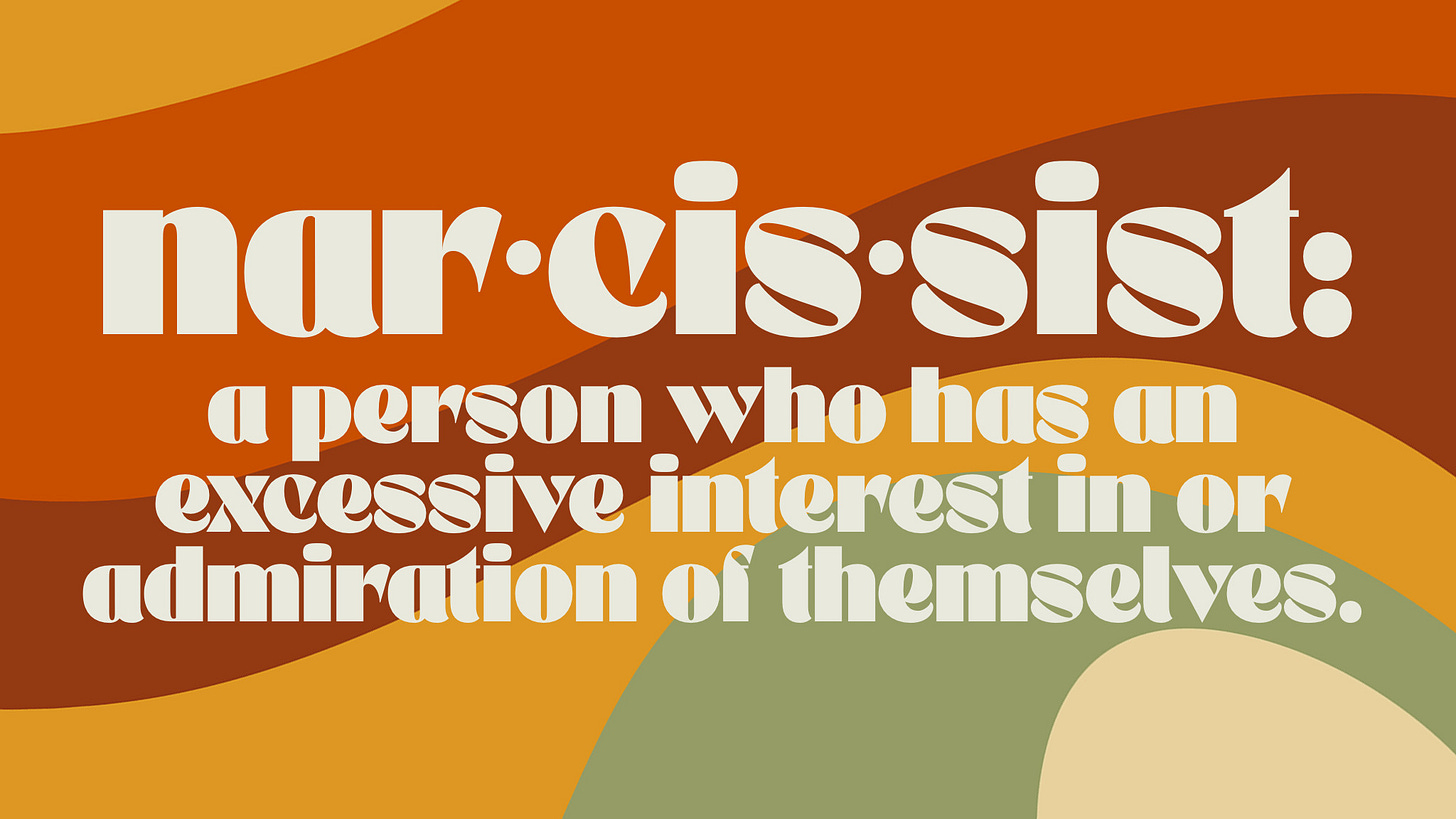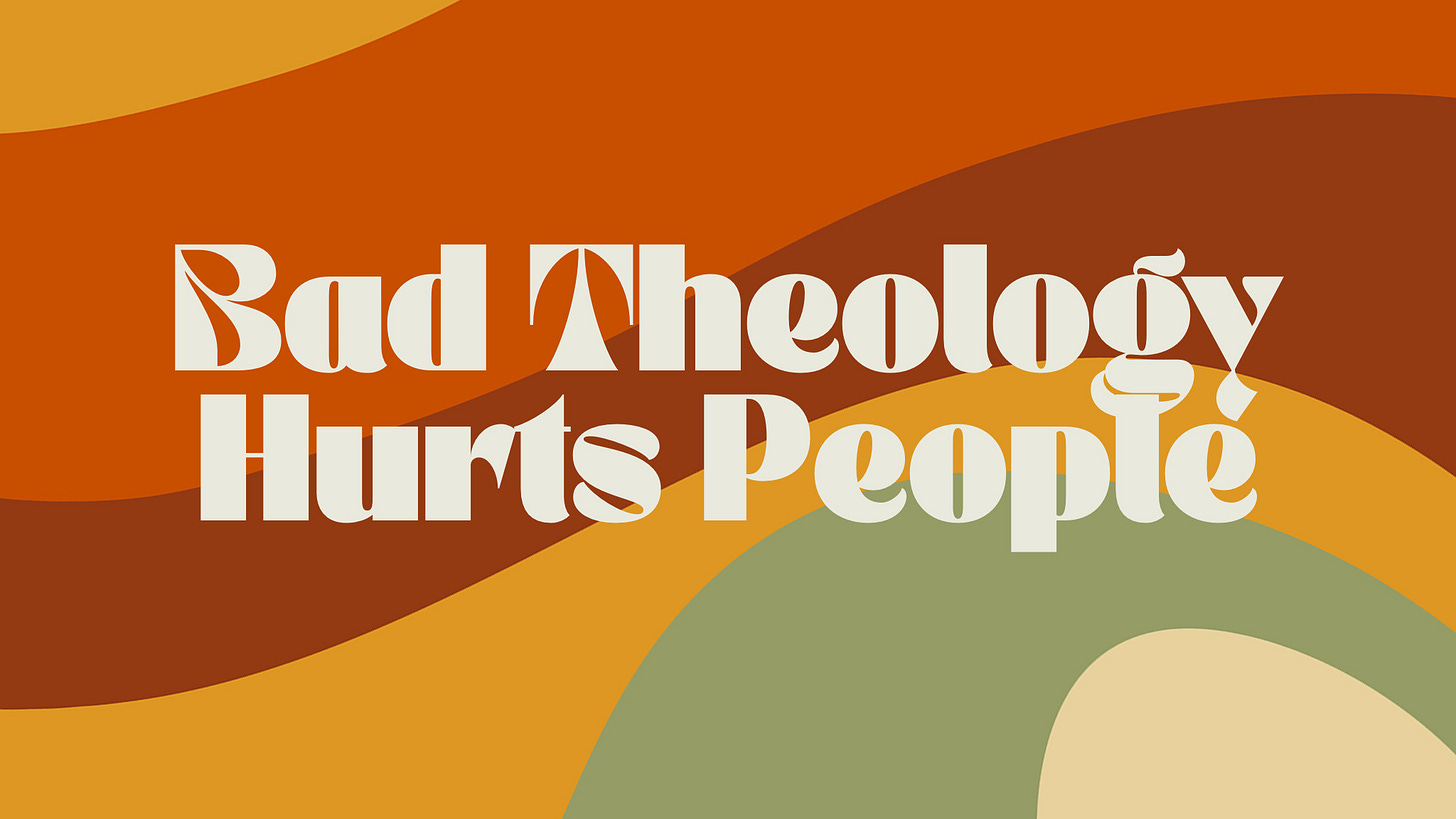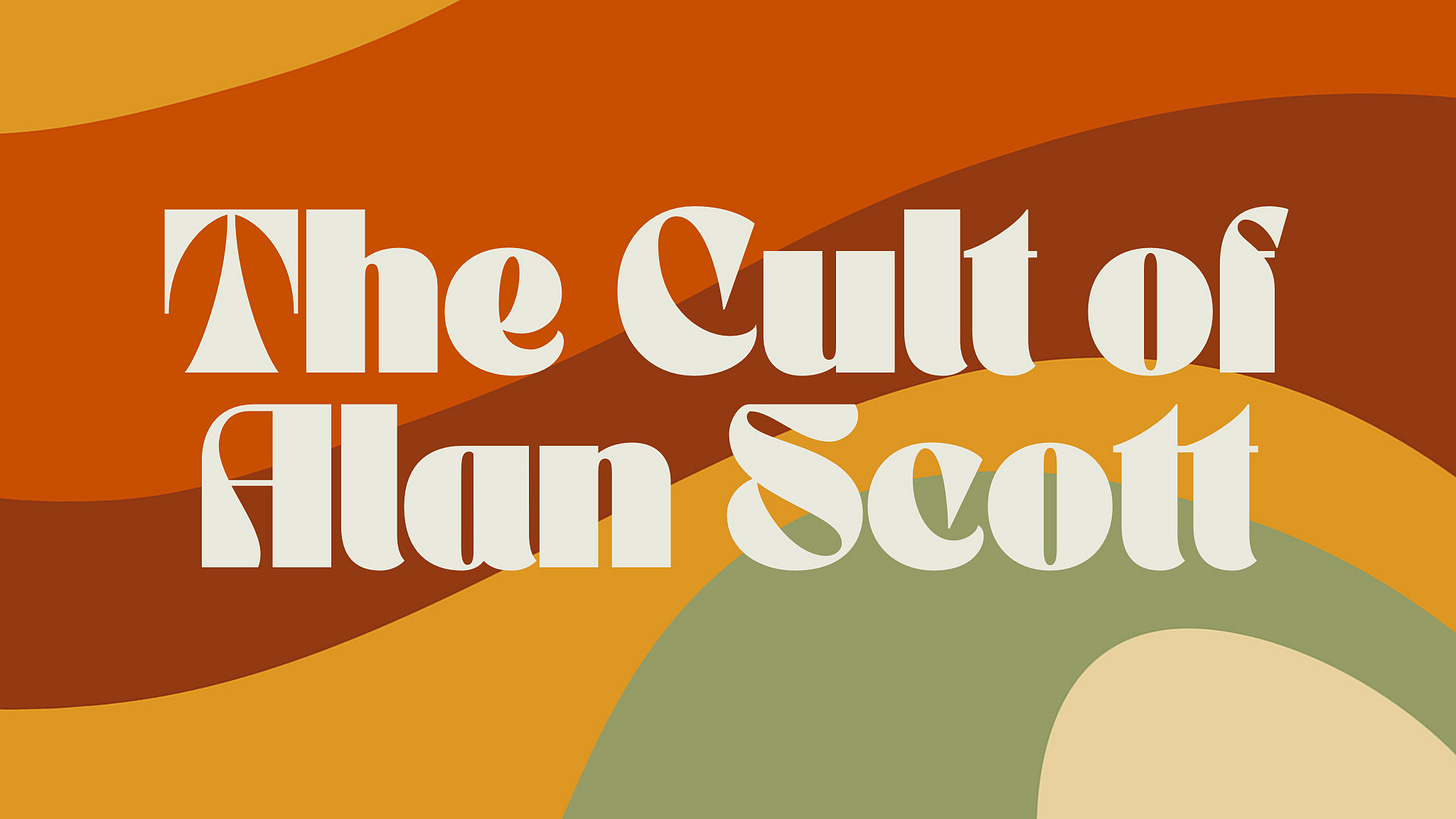Alan Scott, Spiritual Abuse, & the Downstream Impact of Bad Theology
Reflections on Alan Scott, spiritual abuse, Charismatic theology & praxis, and questions about ecclesiology...
The Roys Report has released an exclusive: "Former Vineyard Staff Accuse Alan Scott of Abuse, Manipulation & Lies." Anyone connected to the Vineyard, Charismatic Theology & Praxis, and interested in questions related to ecclesiology needs to read this article. Even more so for those who are currently under the leadership of the Alan & Kathryn Scott, Jeremy & Katie Riddle, Mark Marx, or attending Dwelling Place Anaheim. What’s been happening under Alan Scott’s leadership for years is both deeply troubling, grievous, and, I might add, outright evil. More on that later.
For those of you who are new to the party, I want to outline my own observations over the past decade plus, as well as share some of the concerns I have had about the content of Alan Scott’s teachings as well as his practices. Why? Because I think there are some huge red flags that we can learn from as well as hope for those who may still be under his influence.
So let’s back up…
I first heard of Alan Scott through some friends who served in the Vineyard over in the UK. They asked me what I thought of one of his teachings because they felt like something was “off.” Having only heard his name a few times, I didn’t know much about his content. So I began listening to the few sermons I could find online and followed him on twitter to get a grasp of his… well… message.
It took all of about an hour to determine a few things:
Alan Scott was in the Vineyard and pastoring a Vineyard church and speaking at Vineyard things but was not teaching what I would consider “Vineyard theology.”
Alan Scott held to a “neo-Pentecostal” theology that was rooted in “revivalism,” hype, exaggeration, and outright deception. It was immediately obvious.
Alan Scott was a platonic dualist and constantly approached every topic through the lens of “either/or” thinking as opposed to the more Vineyard “both/and” approach of keeping things in tension that the Vineyard is known for.
Alan Scott clearly considered himself an (A)postle, a (P)rophet, and the recipient of “special revelation” that only he was privy too.
These observations, like I said, came after simply listening to a few of his sermons and reading a few of his tweets. So I told my friends that he wasn’t someone I would ever encourage people to listen to and I was confused as to how he had any influence in the Vineyard. I also wondered why he wasn’t on the receiving end of some feedback with the intent of helping him steer his ship elsewhere in step with classic Vineyard values. But it was the Vineyard of the 2010’s, so it also made sense. It’s entirely possible someone did try and have those discussions and given what we now know about Alan, he wasn’t open to correction, discussion, or a change of course.
And while it goes without saying, it’s not that the Vineyard (or any denomination / movement) shouldn’t hear from diverse perspectives and different traditions. That’s important for health and development. It’s that we need to understand the differences that exist and when someone is given the label of “this is Vineyard” but then espouses ideas and practices that are not in line with our theological practices, we need to talk about it.
The Hero of All his Own Stories.
Back in seminary, I was fortunate to have an amazing professor who I can’t even remember the name of, but his teaching has stuck: preachers should rarely, if ever, be the hero of their stories. Why? Because Jesus should always be the hero of the story (sermon) and it’s also important for people to hear stories about other people’s faithfulness. Plus, and this is especially true in the Vineyard, we have always had a taste for self-depreciating preachers. John Wimber was just a “fat man trying to get to heaven” and having preached in literally dozens upon dozens of Vineyards over the years, it’s like instant credibility when one is able to make fun of oneself. It’s Vineyard homiletic currency. And not just the Vineyard, it seems to work in Baptist churches, charismatic churches, A/G churches, in churches in Africa, Central America, etc.
But whenever I would listen to Alan Scott’s talks, I’d hear him outline the level of his spiritual revelations, how discerning he was, how God’s favor was upon him, and how miraculous his ministry was. All. The. Time.
The amount of “humble brag” that came out of his mouth was, quite frankly, gross. My Vineyard sensibilities made me feel like I was either listening to infomercials or watching TBN. So around 2017, I remember telling another UK friend that he sounds like a narcissist.
Now understand that I do not use the term “narcissist” lightly. I use it in the sense of a mental health condition. A pathological mental health issue that can only be addressed by professionals. While I am not a trained psychologist, I have read enough literature on the subject to be able to know that there is a difference with someone who appears to struggle with pride and someone who is, once again, the hero of every story and has an innate ability to always be the central figure. And for those reasons, I would again suggest people avoid Alan Scott’s leadership (and anyone connected to his ministry due to the fact that, quite frankly, I can’t trust their ability to discern).
Now it’s important to recognize that leadership does require… well… leadership. And vision casting. And reminding people of the stories of God and the stories of the Kingdom at work in communities. And it requires confidence, courage, character, and boldness. But what Alan Scott brought to the table was much different. It was… well… none of those things.
So when Scott resigned from leading the Causeway Coast Vineyard, I was encouraged. It seemed like Alan had perhaps figured out that his theological trajectory was not a good fit for the Vineyard. Many speculated on where he’d end up and I was happy to move on.
And then it happened.
Vineyard Anaheim announced that Alan Scott would be stepping into leadership as a Senior Pastor.
*Sigh*
Of course now we know that he only did so once he knew what assets Vineyard Anaheim had. It’s interesting how at first he wouldn’t pastor there but once he understood that there were millions and millions of dollars and assets to be at his whim, God mysteriously spoke!
What a surprise!
Hype, Hype, & More Hype.
Almost immediately, the hype of the Scott’s arrival spread around the Vineyard and I heard numerous people talk about what God was doing in Anaheim and how the “former glory” had returned and how the church was exploding with growth and how they were returning to “doing the stuff” and how people were being healed and how amazing it was.
Hmmm.
Another way of looking at what was happening was this:
Alan Scott was telling everyone what God was doing. Just trust him.
People who were already Christians were leaving their churches and going to the Anaheim Vineyard as consumers (aka, this is not church growth via evangelism; this is church growth via transfer).
They were very good at social media marketing. It’s Alan’s “brand” — storytelling.
As I listened to the sermons weekly, I noticed a few trends. Again, Alan was always the hero. He brought the kingdom. It was hype central. Hype, hype, and more hype. And at one point, he indicated in one of his subtle jabs at John Wimber that Wimber was “Moses” and Alan was “Joshua” who had arrived to lead the Anaheim Vineyard into the promised land. I wonder why those sermons were removed?
Full stop.
I couldn’t believe it. I have no idea what possessed people to hire him and I think another conversation that needs to take place is how either the numerous concerns from National (and International) Vineyard leadership never made its way into the conversation or those warnings were ignored. But that’s a conversation that needs to happen another day and most likely amongst others. Regardless of the concerns that were expressed over the years, Alan Scott was hired and brought his “brand” of hype to Anaheim.
And can I just say one thing here about hype and deception? Alan and his leadership team have constantly told a story about how when they arrived they started to feed and serve the poor again, as if somewhere along the line it had stopped under the previous leadership.
That was / is a lie. A lie.
The Anaheim Vineyard was serving those in need and feeding people long before he arrived and, under the senior leadership of Lance Pittluck, had done so for decades. Once again, Alan centers the story of his wonderful ministry (*roll eyes here*)
I digress.
I could go on for hours about the absolutely train wreck of theology and practice that I’ve seen amongst Alan Scott. As I listened weekly to sermons in 2019 and 2020, I was shocked. What in the world is happening? How does this happen? Is anyone listening?!?!
At some point I want to dive a bit more into some of the “why” behind those questions. We need to have a discussion about why this has been an issue within the Vineyard for quite some time. There’s something in our “system” that allows for this to happen and I think it’s an important issue for any of us in the Vineyard going forward.
My working hypothesis is three fold: (1) we have too much of an anti-intellectual framework in our bones, (2) we are overly committed to pragmatism (if it works, let it slide), and the most concerning, (3) deep in our foundation is a “failure of nerve” that causes us to “look the other way” (we are, after all, a “relational movement”). But that’s not for today’s discussion.
Bad Theology Hurts People: Alan Scott as a Case Study.
I’ve long held the belief that good theology honors God and serves towards people’s freedom. The corresponding reality is that bad theology dishonors God and hurts people. Alan Scott is a perfect embodiment of this bad theology in practice.
Within the Roys Report’s exclusive article, we learn of:
Alan Scott’s abusive leadership at the Glasgow Vineyard (read this letter here outlining how what we’re seeing recently is the same as when he first started).
Alan Scott’s spiritual abuse of Dr. Luke Martin of the Creed and Culture podcast (listen to his testimony here).
Alan Scott’s spiritual abuse of Cynthia Andrews, former Vineyard Anaheim College pastor.
Alan Scott’s spiritual abuse and tyrannical interaction with Donna Finney, a staff member under his leadership at Causeway Coast who had the audacity to report a child assault without first telling Alan (*gasp*).
Alan Scott & Jeremy Riddle’s spiritual abuse of Noah & Debrianna DeBolt, former worship community members (watch Noah’s video here).
Additionally, Alan Scott forced evangelism quotas on staff, had female staff members confront male volunteers about whether they masturbated, and much, much more. Yikes.
Folks, look at the fruit here. Is this glorifying to God and serving toward people’s freedom? Or is this glorifying to Alan and serving toward those people glorifying Alan as well? It really is that simple.
When is a cult, a cult?
Defining a cult can be challenging, as it’s easy to throw that word around and its application can certainly be in the eye of the beholder. That being said, when a religious community centers itself around a leader and that community is unable to recognize that leader’s weaknesses or character flaws, largely due to the leader telling them that they don’t have them and have special access to God, we need to start considering whether that word applies.
In the case of Alan Scott, it applies.
And not just due to his manner of engaging people, spiritually abusing people, or character flaws. Alan’s role as a cult leader is significantly connected to his epistemology, or more plainly, how he explains how he knows things.
Historic Christianity appeals to Scripture as the infallible authority and since the days of the early church, followers of Jesus have pointed to the historical evidence supporting, for example, the Resurrection (cf. 1 Cor. 15:1-11). Alan Scott’s appeal is to his special revelation. He tells people he has had God tell him things that only he can know and you have to trust him and his special revelation and just obey.
What’s that sound like? It sounds like a cult leader. Every major cult of the last 150 years is built upon the very same methodology.
Why did Alan Scott remove the Anaheim Vineyard from the Vineyard movement? God told him too. Why were his staff and volunteers to do what he says? Because God told him special and secret things about them.
Again, what does that sound like? That sounds just like a cult leader and the focus of this cult is Alan Scott because he has designed it that way.
That may seem harsh and mean-spirited but at this point and after over ten years of listening and observing, I am fully convinced that Alan Scott is a false teacher, false prophet, master manipulator, and extremely harmful to people.
If you attend the Dwelling Place Anaheim, are under the influence of Alan & Kathryn Scott, Jeremy & Katie Riddle, or Mark Marx, I’d strongly encourage you to get out. Your well-being is at stake as well as those who are impacted by such disastrous leadership.
If you know of or you’ve been spiritually abused, please report it! And know that there are many who are praying for you!
Further Things to Discuss…
We’re over 1,500 words now, so I’m going to wrap it up. I think I’m going to spend some time in the future tackling a number of other issues that need to be discussed, including:
A thorough engagement with the topic of Five-Fold Apostolic Ministry. If you are in the Vineyard, we have a really great resource in John Wimber’s Vineyard Reflection “The Five-Fold Ministry” or Alan Hirsch’s APEST model (especially his definitions).
Further discussion about Vineyard ecclesiology, organization, and the re-organization. What systems are going to be put in place that can help prevent this from happening again… and again… and again… while also not sacrificing our central values, practices, and local church commitments?
What influence has the “personality cult” upon the Vineyard and other similar movements? And how can we chip away at the underlying issues that seem to produce such commitment to abusive leaders because, let’s be honest, Alan Scott is not the only example we have in the Vineyard of this work. Hopefully the Guidepost Solutions Institutional Assessment will be made public, be transparent, and lead to systemic change. We’ll see.
Okay. That’s all for now. If you have read through this stream of musings, I hope I’m clear here: Alan Scott is a spiritual abuser, master manipulator, unethical, deceptive, controlling, and a bad, bad, leader. If you attend the Dwelling Place, you should leave.
And theology matters. It matters tremendously.
Let me know your thoughts in the comments. Let’s get into it!
In Christ,
Luke Geraty
About the Author
Luke Geraty is a pastor-theologian in northern California. With a few theology degrees and nearly twenty years of pastoral leadership, Luke loves the Bible, theology, fly fishing, coffee, and books. All opinions are his own and not the views of any other organizations he’s affiliated with. You can follow him on Twitter, Instagram, and subscribe to his YouTube.









My wife and I were part of the Vineyard for over 30 years and I served on the board of Anaheim Vineyard for 12 years while Lance was senior pastor. We have also known the Scotts since the 1990s and watched with much concern their descent into their current version of theology and reality. When we found out they were the leading candidates to become senior pastors, we were dumbfounded and wondered if they--the search committee--had actually done any substantive background investigation. If they had it wouldn't have been hard to get a picture of the dysfunction and trouble they were inviting upon themselves. Through our contacts and relationships we were told that during the so-called vetting process it became obvious that a few specific persons on the search committee were blindly and obsessively committed to the Scotts coming and were unwilling to hear anything negative about them. The sad thing about what has happened at Anaheim/the dwelling is that it was so easily avoidable with proper due diligence.
Hi Luke, I have a hard time understanding some things. It sounds as though Alan's behaviour has a history. both in the uk and in the usa. -my question is, if so many people knew of his theology, behavior and abuse, why wouldn't you or the others share with the search committee? also, why would so many Vineyard leaders write stellar letters of support for Alan? -including Phil Strout and Bubba J and so many others - why would jay pathak go into a meeting with alan asking him to step into more leadership with VUSA if he was all those things people are saying? -i get you may not have the answers but would love to hear your wisdom on how vineyard structure has failed us? thanks mate for your time.